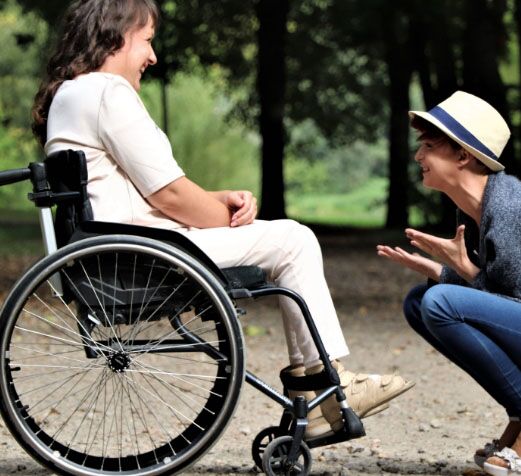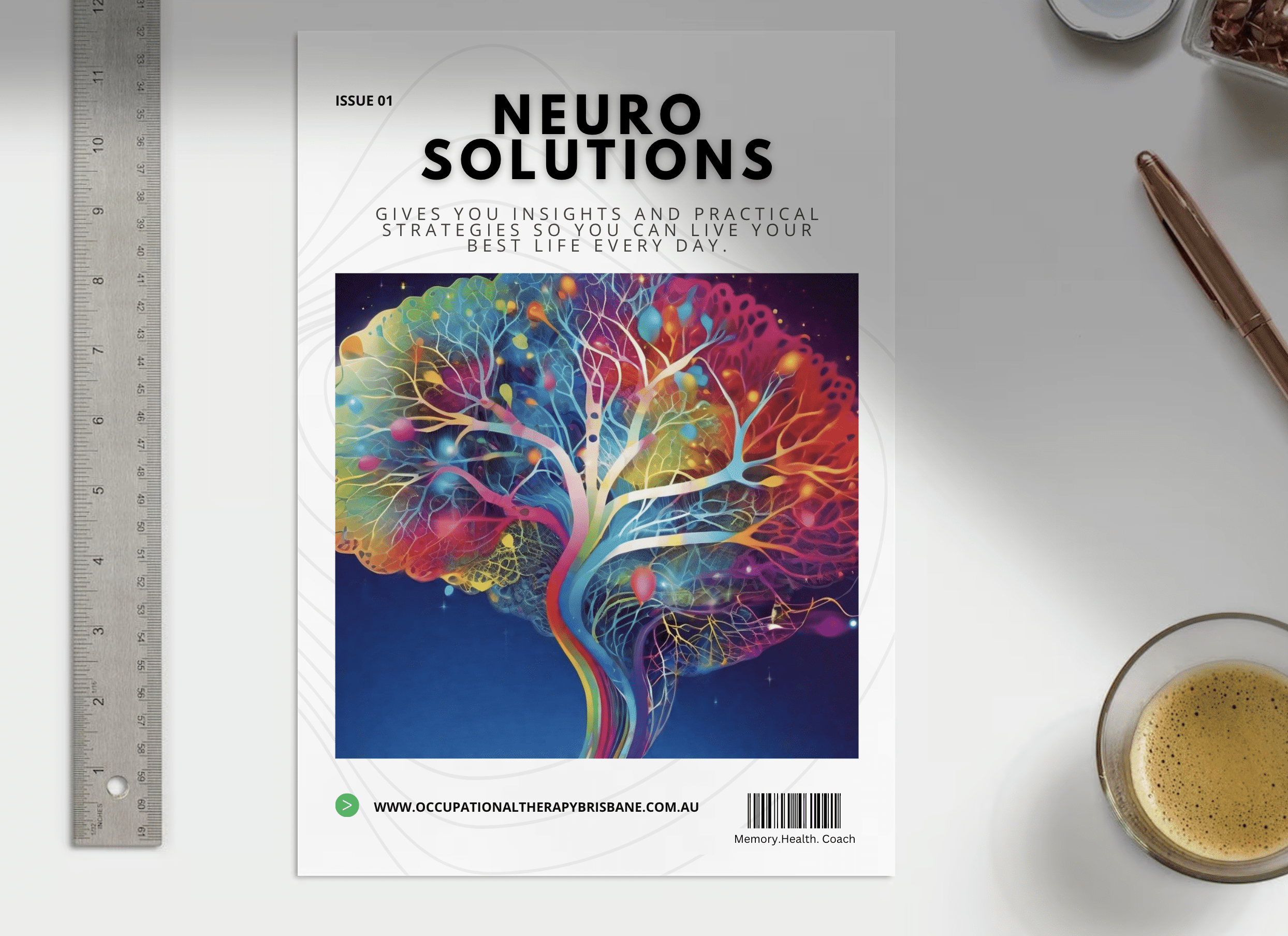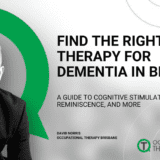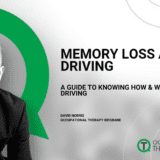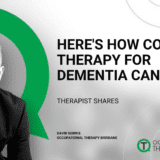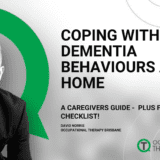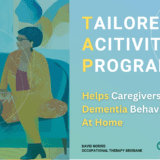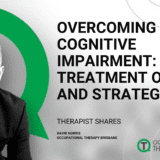Think your parent has dementia?
If you’re worried about your mum or dad’s cognitive decline and are trying to figure out how to talk to your parent about their potential dementia signs – well, it can be an emotional minefield ( for both people).

It doesn’t need to be this way and we’d like to help you.
No doubt, it can be filled with what-ifs, should I, worry, fear, anxiety and heartache.
Seeing the changes in a person who has been a figure in your life can be challenging.
Talking about it perhaps even harder.
But does this concern get in the way of a great conversation, positive actions, a safer life path or achieving a greater quality of life?
An early conversation about dementia signs can lead to early intervention where it may not be dementia at all.
Yep, it can be hard.
This guide is written by a senior therapist, David Norris, to support you if you think your parent has dementia. It serves you so you can talk with your parent about their memory changes, potential signs of dementia and what to do about them.
In this comprehensive guide you’ll learn:
- How many people are having a conversation with their parents? (this might surprise you)
- Key Facts About Dementia
- 10 Dementia Warning Signs (Plus What Not To Do With This List)
- It May Not Be Dementia
- Mum’s Memory Issues Puts Her Daughter At A Crossroad (Raising Dementia, Does Mum Have It? )
- What To Do If You Notice A Sign of Dementia In Your Parents (6 Tips to Support Conversations and Actions)
- Conversation Starters with your parents about memory loss
- A Letter Template to communicate with your parent’s GP (when they won’t)
- Why Early Conversations Are Better To Help With Prevention and Management of Memory Decline (The Waiting Game Doesn’t Work)
- How Does Occupational Therapy Help People Living With Memory Loss or Dementia (What You Can Expect)
How Many People Are Talking With Their Parents About Their Dementia Signs?
If you suspect that your parent has dementia, it may surprise you if people are talking about it. An Alzheimer’s Association report in 2018 found
- 1 in 3 adults said they wouldn’t talk to a family member about the troubling signs of dementia, despite their major concerns
- The reason behind this is the majority said “they would be concerned about offending a family member (76 percent) or ruining [their] relationship with that person (69 percent).
- AND almost 40% indicated they would prefer to wait to talk to their loved one until the symptoms worsened (nextavenue.org)
Key Facts About Dementia
It’s an umbrella term for a group of diseases which share in common a deterioration in memory, thinking, behaviour and the ability to perform everyday activities.
- Sadly, worldwide, around 50 million people have dementia, and there are nearly 10 million new cases every year.
- Nearly 10% of people over 65 years of age will experience dementia.
- The prevalence of dementia increases with age, doubling every 5 years between the ages of 60 and 85 years.
- Women And Memory Loss: Across the world, more women are affected by dementia than men. In fact women outnumber men by almost 2 times! (World Health Organisation)
At Occupational Therapy Brisbane we certainly see this reflected in our clients being more women than men living with dementia.
Think Your Parent Has Dementia? 10 Dementia Warning Signs: (PLUS What Not To Do)
Dementia affects each person differently and depending on the type, as the disease progresses there’s likely a greater life impact of a person’s symptoms.
So at an early stage, there are subtle signs compared to a later stage of cognitive decline where a person may not have the ability to live independently.
- Memory Loss Disrupts Daily Life. One of the changes noted in the early stages of dementia is the difficulties with remembering newly learned information. *** This is different to age related changes which may be difficult at the moment, but remembered later on
- Challenges In Planning or Problem Solving. This may be observed as difficulty in developing a plan. We see this in the clinic often as “Mum has difficult following up on things to get at the shops when she runs out of it”
- Difficulty Completing Familiar Tasks. It may be the subtle signs in familiar, everyday tasks that grabs your attention. Driving, cooking, organising a list can be hard to do. **** This is different to age related changes where it’s ok and very normal to get frustrated with a new microwave or remote or synchronise the TV and latest smart TV.
- Disorientated To Where They Are or What Time It Is. The time of day, the day of the week and being able to navigate in a new or familiar environment may be difficult. *** This is different to age related changes like remembering the day of the week but recalling it later.
- Trouble Understanding Visual Information or Their Position In Space. For some people vision and perception problems may be a sign of dementia. Others may have difficulty positioning their body in relation to objects like a bed, chair or toilet. Their may be subtle signs of changes in the eye contact or visual regard to the environment around them or appear to have difficulty managing their personal space.
- New Difficulties With Finding The Right Words When Speaking Or Writing. You might see in your parent a change in their body language. People with dementia may also experience changes in following a conversation or joining into a conversation. There may be a change in well established skills like typing or writing. A person may experience stopping mid conversation, repeating a conversation and perhaps struggle with naming a common object or label it correctly.
- Misplacing Things And Has Difficulty In Retracing Their Steps. It’s ok to misplace your glasses, however finding them in the fridge or freezer is another matter altogether. People may regularly lose things. We often see families buy a new phone to help a loved one only for it to be misplaced.
- Decreased or Poor Judgement. A loved one may experience changes in judgement or decision making. This might be observed as out of character behaviours around money and household management. This may be also attempting to do activities which may not be appropriate for the weather.
- Reducing Contact With Work Or Social Activities. You may observe a withdrawal from familiar, meaningful activities like hobbies, seeing friends or attending worship.
- People Experiencing Dementia May Also Experience Changes In Mood And Personality
** What Not To Do** This is not a dementia diagnosis tool.
Think of this list as a group of warning signs.
Consider the above list as a tool to start a conversation with your parents about your observations.
If You’re Thinking About Dementia – It May Not Be Dementia
There are many factors that can add up to memory changes. It’s vital that these are investigated and hopefully treated.
Whilst these signs can be linked to dementia there are other factors that could also be showing up as cognitive decline. This can include:
- Infections resulting in delirium
- Changes in hormones such as Thyroid
- Stroke
- Brain Tumour
- A recent fall impacting the head
- Trauma – physical and emotional
- Stress
- Impaired kidney function
And the list goes on. That’s why an early conversation can help connect to right intervention, treatment and support
In the end the above list alerts us to a potential change in brain function which can have a life threatening impact. It serves as tool to help you move into action so that you can get expert opinion and advice from your local doctor or primary care professional.

What To Do If You Think Your Parent Has Dementia
Mum’s Memory Decline Puts Her Daughter At A Crossroad ( Raising Dementia, Does Mum Have It?)
I’ve noticed a change in my mum.
She’s forgetting bits of conversations.
You know, what we spoke about last night on the phone.
Or I’ve asked “ Hey what did the GP say today”..
“GP?…. Oh yes. Nothing really”
That’s not my mum.
She’d be all over this and she’d be talking to me about it.
I’ve raised “Hey mum, are you aware that you’ve said this to me already?”
She’d brush it away as a “senior moment”.
I guess I’ve noticed this more since Dad passed away.
She’s in her late 70s and I’m concerned and am really reaching out to ask what should I do?
The amount of conversation we have had that have pivoted around these points are far too numerous.
Here’s 6 Tips To Help You Have A Conversation With Your Parent (Mum) About Their Memory Symptoms

1. How To Start A Conversation With Your Mum About Her Memory
Firstly, are you the best person to have this conversation with you mum?
Secondly, what is a welcoming and comfortable place to hold the conversation?
Not only is the place a consideration, think also about your body language. The non verbal cues to support the conversation.
There are many aspects to body language that you can consider but here are 3 important ones:
- Eye Contact: Vision is a dominant sense, it’s a powerful sensory tool to help understand our world around us. Maintain a soft, open and relaxed regard in eye contact with a person can be perceived as non-threatening and receptive.
- Body Postures: Avoid body language that expresses frustration, anger or impatience. Keep your body relaxed ( deep breathing may help here).
- Gestures: A gentle touch can help express reassurance and support (Daily Caring)
So if you’re the best position to have a conversation with your parent aim for open ended questions which are a great way to kick off a conversation.
Rather than asking a Yes or No statement, open conversation starters allow for more information to be shared.
Use the warning signs as a statement of your observations rather than a label.
To help, consider these conversation starters.
Hey Mum, I’ve been thinking about the future. I’ve noted that sometimes you do ……< insert example of observation use the warning signs above> How have you observed yourself lately?
Mum, if I saw some changes in your health and ability to manage here at home, how would you like me to talk to you about it ?
Move to a place to support action which includes and empowers your mum.
Mum, what do you think we should do about it?
What support would you like from me?
AVOID THIS “ Mum you’ve shown some classic dementia signs. Did you know that you’re doing this?”
2. The Plan You Have Will Be …. Tested ( It May Not Always Go The Way You Expect It)
Having a good plan, having a clear communication strategy may not always survive full contact with reality.
That said having a few notes may help you, your confidence and your approach rather than just winging it.
The timing and context of the conversation may also have a bearing on how your points are received.
Timing considerations maybe when Mum is at her best. This may be when she is at her most attentive and engaged. Perhaps in a place (home) of familiarity as mentioned earlier.
Is Mum’s Reaction Denial, Acceptance or Something Else?
Some folk may be apprehensive perhaps dismissive of your observations, others may react aggressively or with anxiety.
If there’s any resistance or emotional response which threatens the tenderness and caring of your conversation, step away and come back to the conversation later.
“Hey mum, let’s have a break from this…”
“Hey mum I’ve been thinking about our conversation earlier. You seemed upset/ angry/ anxious about it, I’m concerned it came across the wrong way….
Do you mind sharing your thoughts about it….. “
If mum is still upset or unable to have a conversation about it, perhaps raise it with other family members or her local doctor.
3. When A Parent Showing Signs Of Memory Loss Refuses Help: Having A Conversation With Your Mum’s Doctor
Most doctors have a short amount of time in their days.
Trying to reach them over the phone may be hard.
An email or even a letter may be an effective way to get a message to your mum’s GP about your concerns and your observation of your mum’s risk.
When communicating your concerns with your mum’s GP try and be short, clear and concise (as you can).
Here’s a template to have a conversation with your mum’s doctor.
Dear Dr xxxxx,
Re : My Mum, Name and Date Of Birth and her experience of memory problems
In the last (recent time period) I’ve observed the following changes in my mum’s memory performance and it’s impacting aspects of her life which is unusual for her and concerning for me.
- List examples of conversation, managing day to day life, driving etc
I bring this to your attention as I’ve attempted to raise this with my mum and this was received < describe>.
My siblings/partner ( if relevant) and I are here to support mum as best we can.
Mum has consented or not consented to this communication.
I’d appreciate your support and attention to this matter when next you review her.
If you have any questions or concerns, please contact me directly.
4. Understanding How Changes In The Brain Can Impact Insight and Self Awareness
Even at our best of times, if you’re honest with yourself, we can on the face of it overestimate our performance abilities. That’s normal.
However, with changes in our cognitive fitness seen in some cases of early dementia or mild cognitive impairment a person’s ability to self assess and have insight into their skills and performance capacity may be reduced.
This means being aware of cooking, driving, shopping or communication performance changes may not be apparent to mum. This is an important cognitive skill when it comes to problem solving and memory.
We learn from being aware of our errors, an awareness of ourselves and helps us fine tune our skills or make adjustments.
This occurs in the moment or in a delayed way.
An Example of “In The Moment” – mum corrects the temperature to the stove in response to the onions, adjusts the car in response to the cyclist
An Example of “Delayed”– “I had too much tomato in the dish last time so I’ll add two less this time”
This self awareness can also impact on the conversation path, acknowledgement of challenges or need for support or action.
5. Sooner Rather Than Later: Start Talking With Your Parents About Dementia Signs Early
If you think your parent has dementia, raising your observations about mum’s memory changes, be they subtle or significant is best to do it early.
Being aware of the gravitas of the conversation, taking action with or without support early, when a person is more cognitively able, means that a lot of good work can be done.
In our experience and that observed by organisations like Dementia.org in more advanced stages of dementia a person’s capacity to understand, recall, and have capacity to support a conversation may be significantly limited.
Early conversation can help achieve
- Support early medical and allied health interventions
- Enduring power of attorney. Doing this early when a person has the capacity to choose what they want is key to having a seamless support experience if and when their cognitive abilities change. What is an E.P.O.A ) Enduring Power of Attorney? “An enduring power of attorney is a legal agreement that enables a person to appoint a trusted person – or people – to make financial and/or health decisions. (Public Trustee)
- Set up positive lifestyle routines including physical activities.
- Investing in meaningful and supportive activities
- Discussing future care and living goals such as engaging a home care service provider
- Mapping and planning financial needs
6. Being Present and Offering Support and Help As You Can To Your Parents
One of the factors we observe in people who are thriving at home with memory changes are those with robust and supportive relationships.
Offering your help and support through the assessment, investigation, diagnosis and ongoing days ahead can help address stress, overwhelm and anxiety.
One point to mention here is to be aware of the vision you have about your support role for your mum.
What you want and what you don’t want AND who you need to be in your team to help out.
It’s likely you never expected to be having a conversation or ever thinking about “vision for support” involving you and your mum.
But it’s worth doing and here’s why.
Perhaps the role you most value is that of being a daughter or son but you’re happy to help mum with her calendar management.
For other tasks like, shopping, house cleaning, bathing and dressing this can be supported by another person(s).
We’ve seen families and carers push themselves so hard to be “everything” for their loved one that it can end in a breakdown.
A breakdown in their relationship, their vision of themselves, their own social networks and even in their health.
Carer breakdown is real and it happens more often than not. So, perhaps start with a vision for yourself and your mum. Have this conversation early.
Get a good, stable ( reliable) and quality team around you to focus on the other tasks.
Safeguard your vision for the relationship you want to maintain with your mum.
Here’s What You Can Expect When An Occupational Therapist Works With Your Parents Who Have Dementia Signs
Step 1. It all starts with an initial assessment. In this time ( which may happen over a few appointments) the therapist investigates a person’s current challenges, strengths, weaknesses, opportunities and goals.
Step 2. Building a realistic treatment plan with the person’s goals and needs at the heart of the program. It’s all about maximising a person’s ability to do as much as possible.
This will likely look at lifestyle factors like exercise, sleep, nutrition, social connections, meaningful activities to basic activities of daily living like bathing, dressing and showering as well as assistive technology and the home environment. You might be interested in the article we published: Comprehensive Guide to Assistive Technology for Memory Loss
This sounds like a lot, but our goal is to make it easy and doable for you and your family and care team
Step 3. Review and Support. A lot of the work is done early in the therapy process and it may be more about fine tuning as the therapy plan progresses. Not only that you’ll have the option to connect with a therapist to help advise and support you, a person who is aware of your needs and goals.
Source: Dementia Assessment and Therapy
So, if you’re seeking help, advice or a personalised plan to
- help mitigate the impact of memory loss and
- set a path with a goal to improve quality of life
- get clarity on the right strategies for your situation be it home modifications, assistive technology, daily routines, lifestyle programs, cognitive therapies and more
Online- tele therapy services available Australia wide and local service within the Brisbane area.
Get In Touch Today by calling 1300 783 200 or complete the form below and a team member will follow up.
Get In Touch With Us
How To Talk To Parents About Dementia Signs Article References and Sources
- Alzheimer’s Organisation
- World Health Organisation Dementia Fact Sheet
- Next Avenue.org
- RACGP Dementia Assessment
- Early Dementia Management in General Practice
- QLD Health Noticing Dementia Signs – Recognizing What To Do
- NHS Be Aware of The Signs of Dementia
- Help Guide: Carer Stress and Burnout
- Alzheimer’s.net: Better Alzheimer’s Prevention with Early Detection
- HealthDirect – Worried About Dementia
- Public Trustee: What Is An Enduring Power Of Attorney
- Daily Caring Dementia Care Communication Techniques


